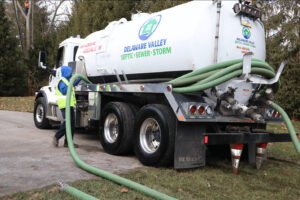There are several myths many people have about their on-site septic system — however, with a better understanding, you’ll be better able to maintain your system and detect any problems over time. Delaware Valley Septic, Sewer & Storm is here to help clear up some of these misconceptions, especially when it comes to septic pumping. Below are some of the most common mistruths we hear about how your septic system works, as well as the truth behind making sure they are working at their best.
Pumping Your Tank Gives You an Overall Inspection of Your System
Although many homeowners believe that having your septic tank pumped gives you a general view of how your on-site septic system is performing, that’s not true. Various components make up a conventional septic system, with one of the most important elements being the drain field, which is not located when a septic pumping service comes to work on your tank. The only way to inspect the whole system is to do a check before the pumping. After the inspection, your septic company can better assist you in keeping your system running correctly.
Additives Reduce The Need To Pump Your Septic System
Certain products on the market claim that they can help regulate your septic and sewer system’s health and minimize how often you need to pump it. However, the promised cure-alls provided by these added “secret microbes and enzymes” rarely do as they’re advertised. Without substantiated claims and evidence, it’s hard to recommend these products as a viable resource.
You Can Build On Top Of Your Septic Tank
Most homeowners have ideas about different ways that they can alter their backyards and add additional value. Building things like standalone sheds, playgrounds, and other structures mean they can better utilize their space, especially if they can build over the septic tank area. If the intention is for a temporary structure, then even better, right? However, this is often not the case.
No matter the type of structure you build over your septic system, problems can quickly arise. The complications from these structures can make accessing the pump for routine pumping difficult and problematic. Additionally, obstructions to the drainage field can prevent adequate oxygen flow to help regulate your septic system.
If The Alarm is Going Off, Your Tank Must Be Full
If your septic system has a pump tank, you will have an alarm in your home to alert you when something’s not right. When the alarm sounds, some homeowners assume it’s telling them it is time to have the tank pumped, but that’s not always true. It can mean many different things. The pump may have shorted out from a storm, the wiring may be compromised, or a float could have failed or fallen to the bottom of the tank. We recommend calling your septic provider straight away so that they can address the system requiring attention before any sludge and scum layers and other sewage treatment goes where it shouldn’t.
If Everything is Flowing Fine, Then You Don’t Need To Pump My Septic Tank.
Generally, homeowners should have their tank pumped once every one to three years, depending on how many occupants your home has. You should note that this timeframe ought to be shorter for those with many family members living at home. If you don’t pump your septic tank, then the debris, solids, and other household waste will eventually build up and make their way into the septic system’s drain field and cause damage. The best thing you can do to maintain your system is to pump your septic tank, which is much cheaper than an annual sewer bill.
Clogged Systems Can’t Be Fixed And Need Replacing
While a clogged system presents a unique set of challenges, it does not mean you need to replace the entire system. With the help of an experienced septic system technician, you can receive the help you need and unclog your system before the damage becomes too severe.
You’ve Never Had a Problem, So Your System is Fine.
Most homeowners don’t discover they have a problem until they put their home on the market and their buyers perform an inspection. Just because you don’t see any issues on the surface does not mean there isn’t one beneath.
The best way to maintain your septic system is to have it inspected once every few years. By avoiding the misconceptions listed above, you can add many years to your septic system and avoid potential issues.
Take our quiz to see if you can separate fact from fiction about your septic system!
To learn more about septic system pumping, or if you’re looking for septic installation, whether you’re in Montgomery County, Chester County, Delaware County, or any of the surrounding areas, contact our team at Delaware Valley Septic, Sewer, and Storm today!




